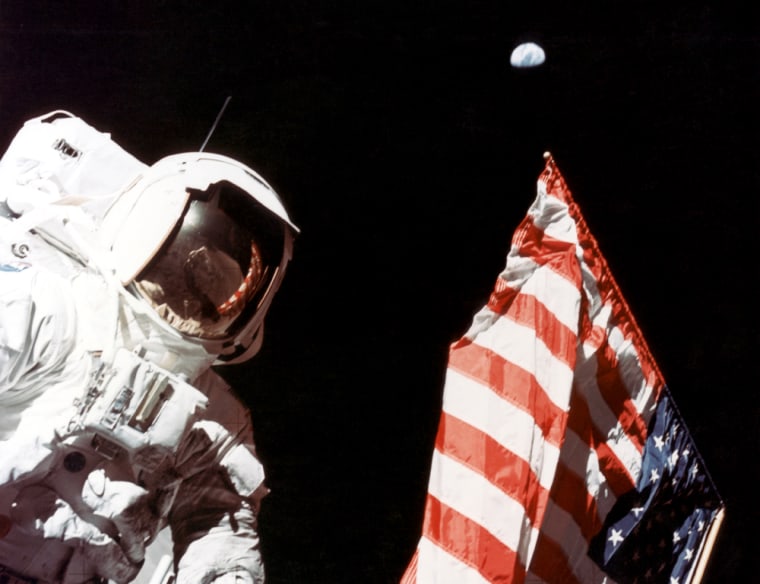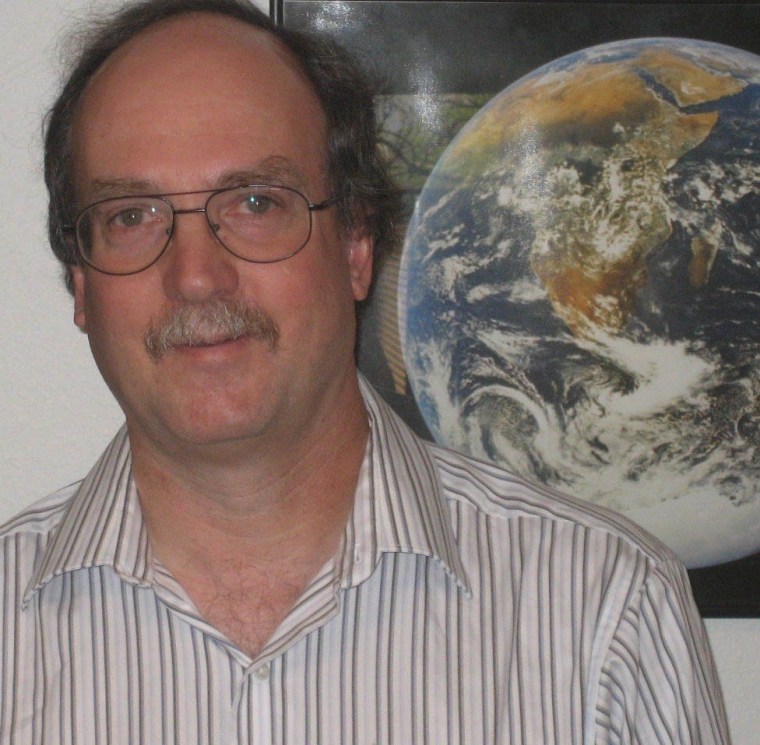
NASA's Apollo moonshots still have a powerful hold on the imagination, but is all that nostalgia actually holding us back on the final frontier?
Rand Simberg, a self-confessed "recovering aerospace engineer" who's now making his mark as an analyst and commentator on space policy, suspects that's the case. Simberg and I discussed the problems with the past and the challenges facing America's future space effort on "Virtually Speaking Science," a talk show you can listen to over the Web.
The power of the Apollo paradigm has been in full view over the past week — at movie theaters, where the horror flick "Apollo 18" pulled in $10.7 million over the Labor Day weekend; and on the Web, where the release of new pictures showing the Apollo landing sites created a sensation.
How long will it be before the next politician calls for an energy "Apollo project," as Barack Obama and Mitt Romney did during the 2008 presidential campaign? (John McCain, ever the maverick, called his proposed Apollo project the "Lexington Project.")
Even NASA has been taking pages from the Apollo playbook, at one time calling its plan to return to the moon "Apollo on steroids." But Simberg argues that Apollo's big-government approach provides exactly the wrong lessons for future space exploration. The way he sees it, spaceflight in the post-shuttle era has to become much less dependent on government funding.

"That's going to start happening a lot more in the future, particularly now that we've moved out into this era where the government can't afford to do it anymore," he said during a recent interview for the MoonandBack website. "If the people who want to do things in space don't fund it, it's not going to happen, and that's a reality people need to accept. They're not going to do it with the taxpayer's money anymore, probably. Apollo's over."
Today, on the Competitive Enterprise Institute's OpenMarket weblog, Simberg referred to the brouhaha over whether NASA might abandon the International Space Station due to a Russian Soyuz glitch — and complained that the space agency's aversion to risk is a "symptom of our continuing to pretend that we understand why we are sending people into space at all with federal money."
"Until we have a grown-up national discussion about that, shed of nostalgia for Apollo and 'national greatness,' not to mention the white-collar welfare aspects and myths about technology spin-off, the vast majority of taxpayer funds spent on this endeavor will be wasted," he wrote.
It's not that Simberg, an adjunct scholar at CEI, is an Apollo-hater. Far from it: He's one of the folks behind the creation of "Evoloterra," a secular liturgy aimed at commemorating "the wondrous accomplishments achieved by the human beings of planet Earth" each year on July 20, the anniversary of the Apollo 11 moon landing.
Simberg still believes the Apollo moon landings were "a historic achievement" from a technological and even spiritual perspective. It's just not the way to run a sustainable space program.
"I tend to think of Apollo as not having much to do with space in terms of opening it up" as a frontier, he told me.
Is the space frontier even worth opening up? Simberg said policymakers see the space program as more of a jobs program. "The reason space policy is a mess is because it's really not 'important' ... to the people who make the decisions about it," he said.
Although Simberg shies away from being pigeonholed as a Republican or a conservative, he's in favor of free-market, small-government solutions. That means he often finds himself in the camp opposing Obama — except when it comes to space policy. He's strongly in favor of the Obama administration's push to commercialize spaceflight to low Earth orbit. His weblog, Transterrestrial Musings, keeps close track of the ups and downs of SpaceX, Blue Origin and other players in the commercial space race.
In Simberg's view, the worst thing about Obama's space policy is that Obama is behind it. "It's just very unfortunate that it's this administration that managed to come up with this one enlightened policy," Simberg said. "The biggest political challenge is trying to make sure that if/when the Republicans take over ... they don't have a kneejerk reaction to everything that came out of the White House."
Simberg is working on that challenge, through his writings for the Washington Examiner, Pajamas Media, The New Atlantis, Popular Mechanics and other outlets. Sometimes it's an uphill battle.
"People ought to think space is important, but the problem is that we've never had an intelligent discussion of why we send people into space," he told me.
Did we see that discussion during tonight's debate for GOP presidential hopefuls? Not really: They had other issues on their mind. But Rand and I had that discussion tonight on "Virtually Speaking Science."
Previous podcasts from 'Virtually Speaking Science':
- Marty Hoffert on the clean energy revolution
- George Djorgovski on doing virtual astronomy
- Alan Stern on suborbital science and NASA's mission to Pluto
- Col. 'Coyote' Smith on space solar power
- Tim Pickens on private-sector moon missions
This post was updated at 11 p.m. ET to include the archived podcast of tonight's installment of "Virtually Speaking Science."
Connect with the Cosmic Log community by "liking" the log's Facebook page, following @b0yle on Twitter or adding me to your Google+ circle. You can also check out "The Case for Pluto," my book about the controversial dwarf planet and the search for other worlds.
